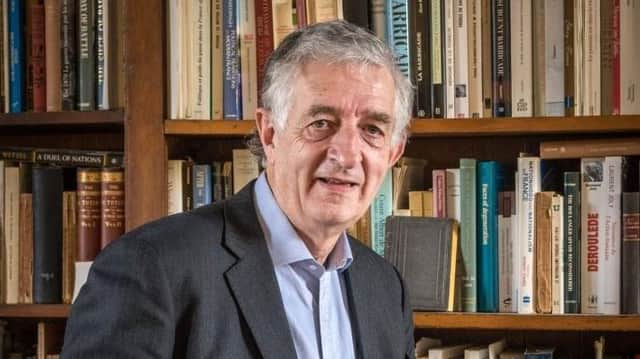Ruth Dudley Edwards: Graham Gudgin gets a deserved CBE - an economist who cites uncomfortable facts


This is a very senior award, just one below a knighthood, which is given for those who have played “a conspicuous leading role in regional affairs through achievement or service to the community, or a highly distinguished, innovative contribution in his or her area of activity”.
The brief citation is “Dr Graham Harold Gudgin, for services to economic development in Northern Ireland” but Graham has had a livelier career than that sounds, for he is intellectually adventurous, principled and has the courage of his convictions.
Advertisement
Hide AdAdvertisement
Hide AdIn 1985, sixteen years into the Troubles, he was headhunted to set up from scratch the Northern Ireland Economic Research Centre (NIERC) and abandoned tranquil Cambridge, where he was Economics Fellow at Selwyn College, Cambridge.
He and his Welsh wife Lynette took to Northern Ireland immediately because of the friendliness, informality and down-to-earth attitudes of those they met.
Moreover, his children — who had been at a poor Cambridge comprehensive — were given a far superior grammar school education at Methody.
He soon had a dozen economists.
In its early years. the NIERC focused on how to raise productivity and cut unemployment. Always pro Union, he set up the Cadogan Group of like-minded academics and writers who understood the importance of exploring financial realities.
Advertisement
Hide AdAdvertisement
Hide AdI used to meet Graham at British Irish Association (BIA) conferences where he calmly expressed unfashionable opinions.
I became a fan when he suggested that a statue should be erected in a dark corner of Belfast to the unknown British taxpayer.
While the main work of the NIERC in its first decade was to raise productivity and cut unemployment, this research led him to examine the almost unchallenged view that in Northern Ireland Catholics were heavily discriminated against in housing and employment.
His detailed study of the statistics led him to conclude that many of the accusations were wrong and exaggerated.
Advertisement
Hide AdAdvertisement
Hide AdHe remarked wryly that having been brought up with three siblings in a caravan without running water or electricity for most of his primary school years he was a bit more resistant than some to stories of housing difficulties in NI.
He found, for instance, that the 1971 census showed that Catholics had a disproportionately large share of state-owned houses, a straightforward fact nationalists deny and unionists have failed to highlight.
Graham also unfashionably took the view that high Catholic unemployment stemmed from a combination of a high birth rate and a reluctance (unlike Protestants) to migrate for work.
He and I were at a BIA meeting when the election of David Trimble as leader of the UUP was announced and everyone — except us — was horrified, because they thought him hardline. “It never occurred to them that an intelligent and thoughtful leader of Northern Ireland’s main unionist party would be an asset in securing peace.”
Advertisement
Hide AdAdvertisement
Hide AdAlthough he had been an opponent of the Belfast Agreement — because he believed that “an involuntary coalition involving parties dedicated to the destruction of Northern Ireland” was not a sensible or sustainable way to run the province — he accepted Trimble’s invitation to become a Special Adviser in 1998.
His four years there were exciting, though his conclusion was that the main achievement of the assembly was in existing rather than anything it actually achieved, not least because all the parties were deeply conservative and resisted all reforms.
In 2002, with Neil Gibson — now Permanent Secretary of the Department of Finance — he set up a commercial consultancy specialising in economic analysis and forecasting, which still survives in Lisburn as Oxford Economics.
Their work on company taxation caused the government to devolve corporation tax to the NI Assembly — a valuable power it has never had the courage to use.
Advertisement
Hide AdAdvertisement
Hide AdGraham lives in Cambridge (for family reasons) as well as Northern Ireland, writes regularly, is a visiting professor at Ulster University, and chief economic adviser to the think tank Policy Exchange.
Having been a prominent advocate for Brexit he was an adviser to government on alternatives to the protocol and he now co-edits the invaluable Briefings for Britain.
Delighted about his CBE, he said: “I feel it’s a great honour…It’s very nice to think something was achieved to help Northern Ireland; I certainly hope so.”